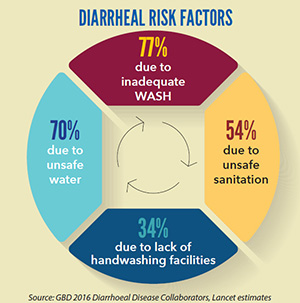Ahmedabad
(Head Office)Address : 506, 3rd EYE THREE (III), Opp. Induben Khakhrawala, Girish Cold Drink Cross Road, CG Road, Navrangpura, Ahmedabad, 380009.
Mobile : 8469231587 / 9586028957
Telephone : 079-40098991
E-mail: dics.upsc@gmail.com

Unsafe WASH practices
News: Recently, according to a report by the World Health Organization (WHO) titled 'Burden of Disease Attributable to Unsafe Drinking Water, Sanitation and Hygiene: 2019 Update,' unsafe WASH practices have led to significant loss of lives and widespread disease burden.
Background:
• The report summarizes the estimates of the burden of disease attributable to unsafe drinking water, sanitation, and hygiene for the year 2019 for four health outcomes - diarrhoea, acute respiratory infections, soil-transmitted helminthiases, and undernutrition
What is WASH?
• WASH is an acronym that stands for the interrelated areas of Water, Sanitation, and Hygiene.
What are SDGs linked to WASH?
• SDG 3 - Good Health and Well-being - WASH is essential for preventing the spread of diseases and promoting good health.
• SDG 6 - Clean Water and Sanitation
• SDG 12 - Responsible Consumption and Production - WASH is critical to ensure responsible consumption and production of water resources.
• SDG 13 - Climate Action - Climate change can impact access to safe drinking water, sanitation, and hygiene, making WASH an important component of climate action.
Key Findings:
• Unsafe WASH was responsible for an estimated 1.4 million deaths in 2019, accounting for 2.5% of the total global deaths and 4.9% of the total global disability-adjusted life years (DALYs).
• Diarrhoea was the leading cause of death and DALYs attributable to unsafe WASH, followed by undernutrition, acute respiratory infections and soil-transmitted helminthiases.
• Children under 5 years of age were the most affected by unsafe WASH, bearing 72% of the deaths and 70% of the DALYs.
• The burden of disease attributable to unsafe WASH varied significantly across regions, with the highest burden in sub-Saharan Africa, followed by South-East Asia and Eastern Mediterranean.
• Improving access to safe WASH could prevent an estimated 1.4 million deaths per year and reduce the global disease burden by 6.6%.
• Achieving universal access to safe WASH by 2030, as envisioned by the SDG 6, would require significant investments and efforts in terms of infrastructure, governance, monitoring and behaviour change.

Address : 506, 3rd EYE THREE (III), Opp. Induben Khakhrawala, Girish Cold Drink Cross Road, CG Road, Navrangpura, Ahmedabad, 380009.
Mobile : 8469231587 / 9586028957
Telephone : 079-40098991
E-mail: dics.upsc@gmail.com
Address: A-306, The Landmark, Urjanagar-1, Opp. Spicy Street, Kudasan – Por Road, Kudasan, Gandhinagar – 382421
Mobile : 9723832444 / 9723932444
E-mail: dics.gnagar@gmail.com
Address: 2nd Floor, 9 Shivali Society, L&T Circle, opp. Ratri Bazar, Karelibaugh, Vadodara, 390018
Mobile : 9725692037 / 9725692054
E-mail: dics.vadodara@gmail.com
Address: 403, Raj Victoria, Opp. Pal Walkway, Near Galaxy Circle, Pal, Surat-394510
Mobile : 8401031583 / 8401031587
E-mail: dics.surat@gmail.com
Address: 303,305 K 158 Complex Above Magson, Sindhubhavan Road Ahmedabad-380059
Mobile : 9974751177 / 8469231587
E-mail: dicssbr@gmail.com
Address: 57/17, 2nd Floor, Old Rajinder Nagar Market, Bada Bazaar Marg, Delhi-60
Mobile : 9104830862 / 9104830865
E-mail: dics.newdelhi@gmail.com